This post is the final chapter to the trilogy for The Hall of Egress. Here are parts one and two for review.
The Current Conditions for Finn’s Game
The mental framework from which Finn reasons through the puzzles thrown at him by the dungeon is built from his past experiences. Who he is and how he interacts with the dungeon are both shaped by his past. Therefore, any attempt with an approach to tackle the conundrum from a different perspective without precociously changing the mental framework in which he derived this new perspective will always result in the same outcome: starting at the origin point of when Finn first entered the hall.
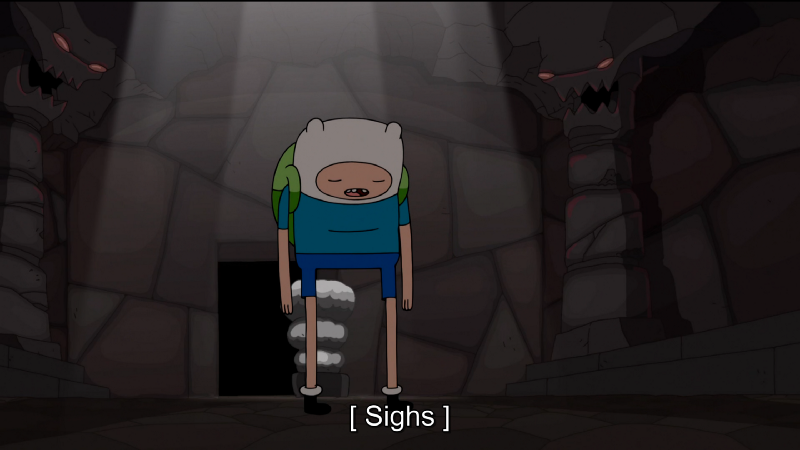 Teleporting back to the dungeon…a consequence for opening the eyes prematurely.
Teleporting back to the dungeon…a consequence for opening the eyes prematurely.
Present self-image cannot exist without the past. The past is setting the cage to our unchained state of present mind that is ever so floating in the ether. At every sector of our psyche of what defines us, there are prewritten prejudices and biases of the past that shape how we interact and view the world: an autobiography of the habitual habits we create.
Strategies
Finn has three strategies to choose from:
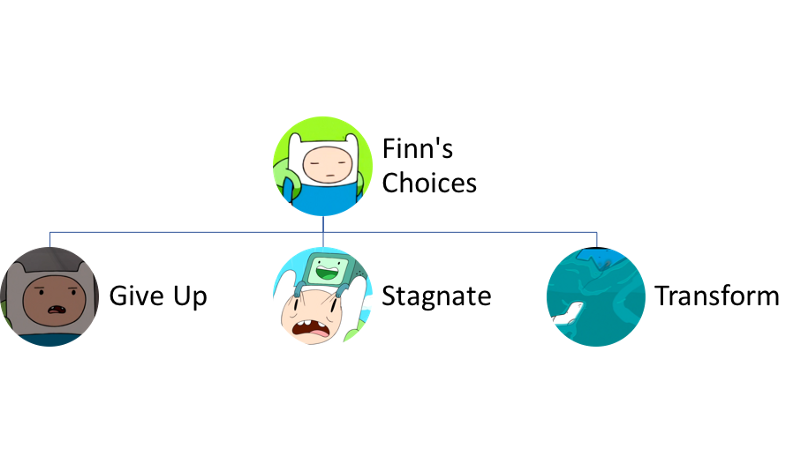 Decision Tree
Decision Tree
Give Up
For Finn to give up is not as negative as society thinks it to be. The story of Sisyphus in Greek mythology is easily relatable to Finn’s situation; the gods punished Sisyphus to endlessly roll an enormous boulder up a hill, only for the boulder to roll back down for all of eternity due to his constant trickery and deceitfulness.
Albert Camus argues the presupposition to life is that it is absurd and meaningless. He then presents multiple examples of dualisms, happiness vs sadness, life vs death, good vs evil, and how people are living in a paradox. It would not make much sense for one to to live in happiness if one truly understands one’s mortality and the universe’s silence to one’s, petty problems (a spec in the universe). In Camus’s book Le Mythe, Camus proposes a solution to living with such a paradox: to give meaning to one’s life.
To decide whether life is worth living is to answer the fundamental question of philosophy.
Sisyphus conquered his immutable fate of rolling the boulder up the hill for eternity by accepting it. Sisyphus found happiness by accepting his fate and simultaneously revolting against it.
There is no fate that cannot be surmounted by scorn (of fate).
If Sisyphus is beyond fate, then Sisyphus is free to create his own, meaningful life, irregardless of what the gods planned for Sisyphus. Fuck the gods, as it is up to us to create meaning in our lives.
However, this option wouldn’t fit to Finn’s personality as the episode suggested that he is not the kind of person to give up.
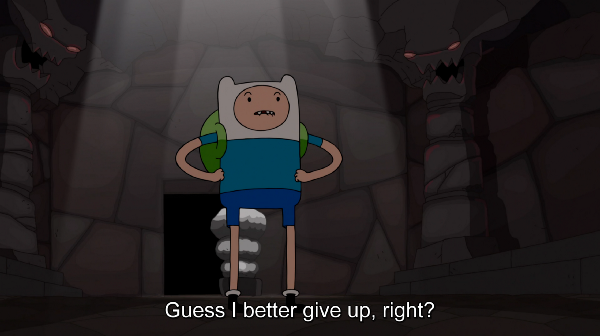 Wrong. Wrong! Let’s try that again.
Wrong. Wrong! Let’s try that again.
Stagnate
Although Finn could keep living out his life with Jake and BMO with hopes to Finn’s situation miraculously changing, this option is crossed out when Finn decides this journey he must go on is a single-player, introspective game.
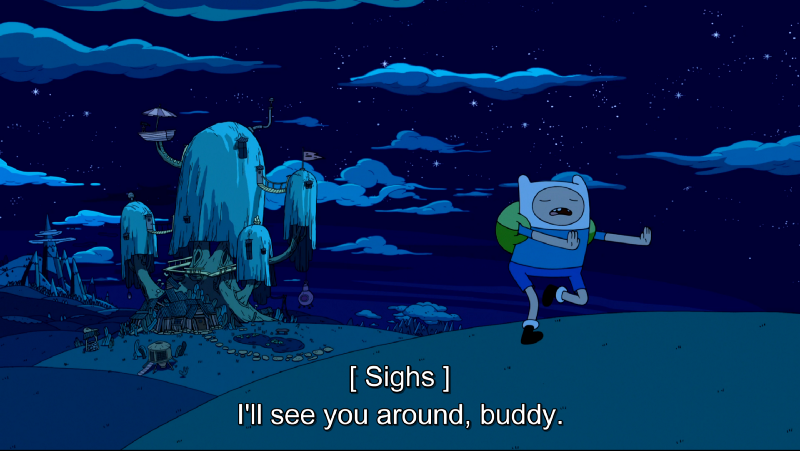
Transform
If Finn’s past is continuously shaping his present, the only way Finn can start anew is to get rid of his past, composing of his self-image and his friends. Therefore, Finn must shed the comforts of what defines him as a person and he must run away in hopes to recreate the mental framework in which he hopes to newly perceive of the world.
Oh, Jake. I know you mean well, but I guess I got to see this one through on my own.
René Descartes reflects in his book Meditations on First Philosophy that the world cannot provide a guaranteed foundation on which all knowledge can be birthed from. A lot of “truths” that are learned at a young age are nothing but prejudices and biases, some of them being passed down from our parents. Therefore, the knowledge we learn through our personal experiences are created from a foundation that is tainted with falsehoods.
Several years have now elapsed since I first became aware that I had accepted, even from my youth, many false opinions for true, and that consequently what I afterward based on such principles was highly doubtful; and from that time I was convinced of the necessity of undertaking once in my life to rid myself of all the opinions I had adopted, and of commencing anew the work of building from the foundation… -René Descartes, Meditation I, 1641
Descartes proposes a systematic process called the Cartesian doubt. The process is defined as follows:
- Doubt everything one knows.
- Go through each “truth” and accept only the ones that are true.
- Break down each truth into smaller, understandable units.
- Solve the simple units first.
- Derive further “truths” from accepted “truths”.
This is exactly what Finn sets out to do.
He throws away his self-identity representing his past and present and accepts the truth of the fact that “something needs to be different.”
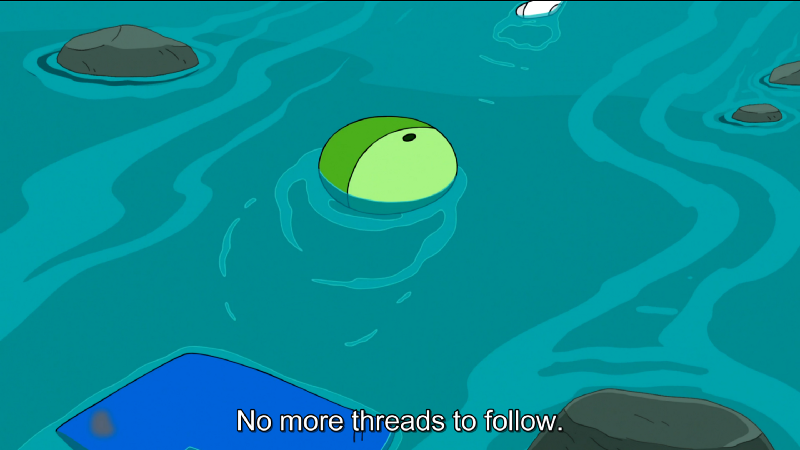 ‘No more threads to follow. No more egress.’
‘No more threads to follow. No more egress.’
And then he starts to learn the truths of the new reality he lives in.
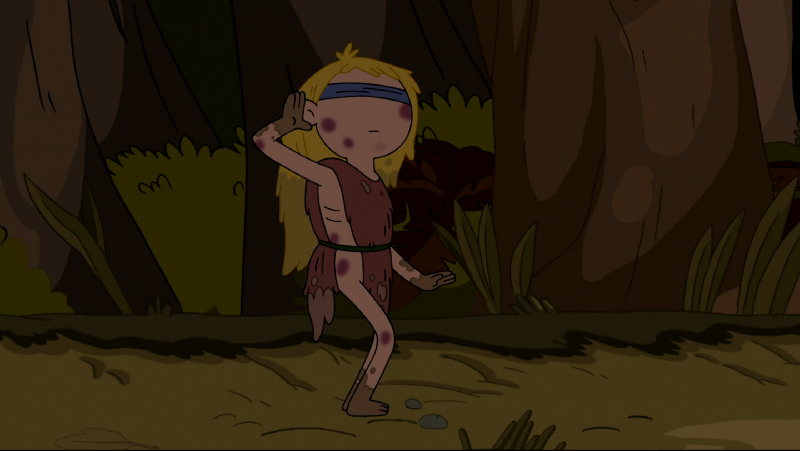 Finn starting anew.
Finn starting anew.
While I was watching this part of the episode, I was such in awe of Finn’s bravery to drop the foundation of who he is in hopes to gain a different perspective on life. I think everyone should utilize Descartes’ method of Cartesian doubt. It is indubitably TERRIFYING to drop one’s past, one’s mental framework, only for a chance to evolve. However, I think this step is important if one is to create new knowledge from carefully constructed truths, deleting false opinions along the way.
Aftermath
Finn incidentally enters the dungeon, but realizes something is different when he can actually touch the Hall of Egress door instead of phasing through it like always. This is the moment when Finn decides to open his eyes.
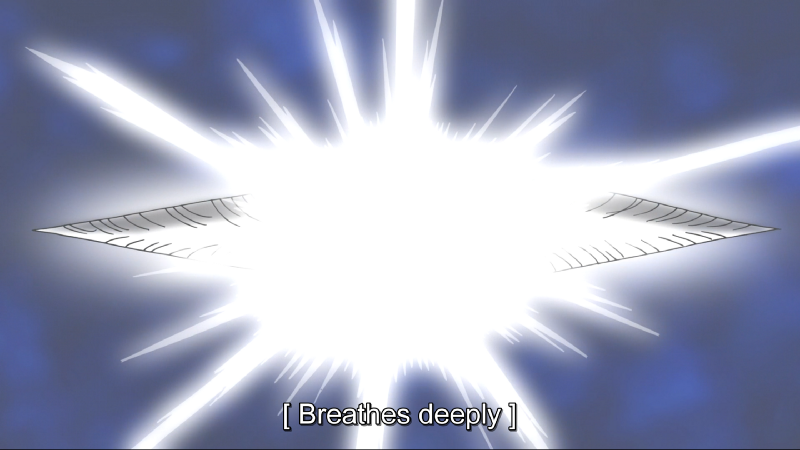 Oh! The symbolism…
Oh! The symbolism…
Finn successfully navigates out of the dungeon to finally reunite with his best friend, Jake.
 Yay!
Yay!
At the end of it all, you still come out of the process as yourself and will probably view the world in similar terms as before. Strong relationships will endure your absence during your transformation and will somewhat be a reminder to who you once was. But after the transformation, you will have acquired a new, stronger, mental framework to interact with the world.
Everything stays, but it still changes ever so slightly.
References
- https://philosophy.stackexchange.com/questions/36624/is-sisyphus-actually-happy-or-is-he-content
- http://dbanach.com/sisyphus.htm
- http://www.iep.utm.edu/camus/
- https://en.wikipedia.org/wiki/Albert_Camus
- https://en.wikipedia.org/wiki/Meditations_on_First_Philosophy
- http://people.tamu.edu/~sdaniel/Notes/descar1.html
- https://www.youtube.com/watch?v=PnK5B49KKvo
